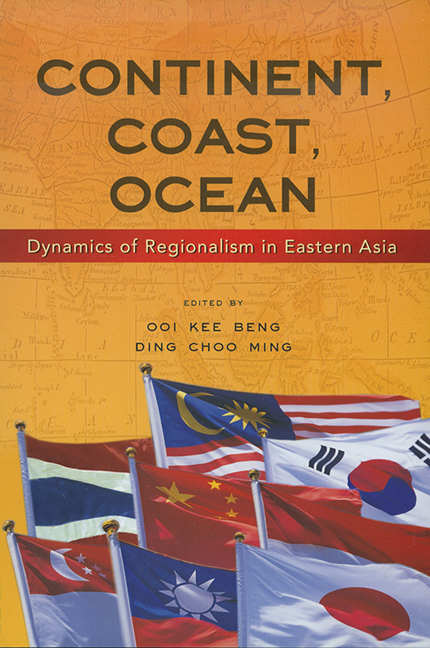Book contents
- Frontmatter
- Contents
- Foreword by Shamsul A.B.
- Contributors
- Introduction
- PART ONE PUTTING JAPANESE IMPERIAL HISTORY TO REST
- PART TWO THE ECONOMICS OF REGIONAL INTEGRATION
- PART THREE INTER-REGIONALISM AND REGIONALISM
- PART FOUR NEW KNOWLEDGE, NEW PROBLEMS, NEW SOLUTIONS
- 9 Reinventing Traditional Values for Our Future: A Malaysian Organizational Response
- 10 The Dynamic Growth Order in East and Southeast Asia: Strategic Challenges and Prospects in the Post-9/11 Era
- 11 Islam in Asia: The Way Ahead
- Index
9 - Reinventing Traditional Values for Our Future: A Malaysian Organizational Response
from PART FOUR - NEW KNOWLEDGE, NEW PROBLEMS, NEW SOLUTIONS
Published online by Cambridge University Press: 21 October 2015
- Frontmatter
- Contents
- Foreword by Shamsul A.B.
- Contributors
- Introduction
- PART ONE PUTTING JAPANESE IMPERIAL HISTORY TO REST
- PART TWO THE ECONOMICS OF REGIONAL INTEGRATION
- PART THREE INTER-REGIONALISM AND REGIONALISM
- PART FOUR NEW KNOWLEDGE, NEW PROBLEMS, NEW SOLUTIONS
- 9 Reinventing Traditional Values for Our Future: A Malaysian Organizational Response
- 10 The Dynamic Growth Order in East and Southeast Asia: Strategic Challenges and Prospects in the Post-9/11 Era
- 11 Islam in Asia: The Way Ahead
- Index
Summary
Dedication: This humble effort of mine is dedicated to the late Professor Norazit Selat, a very dear childhood friend and Director of the Academy of Malay Studies, University of Malaya, Kuala Lumpur, who passed away on 27 January 2004.
INTRODUCTION
In contemporary international politics, the phrase “reinventing traditional values” can be misconstrued as an effort to reintroduce “fundamentalism” of sorts, such as Muslims and Islam have been accused by the West of doing. So the tradition of wearing turban and beard, head scarf and all sorts of head covers, whether in traditional or reinvented forms, is being prohibited by law, for example in France. Important as it is for those in the East to observe, preserve and reinvent traditions and traditional values, the globalized world has other plans for us. As such, our efforts at reinvention must take cognizance of the world beyond the East. In other words, not all reinventions of traditional values are welcomed by all parties at all times. However, there is one particular “traditional value”, if we may refer to it as such, that is continually reinvented because of its cumulative nature and its critical role in our intellectual life. This refers to the “traditional value” of knowledge-seeking and of being involved in knowledge-generating activities, which is the focus of this chapter.
Terms such as “East Asia”, “Southeast Asia”, “traditions” and “traditional values” signify both abstract and real entities. They are “forms of knowledge” in that each is reconstituted over time either in the form of academic or non-academic texts (paper-based and digital-based), images or memories. Because they are forms of knowledge, they are not only subjected to reinvention but reconstruction through new findings, and have often to be repackaged in response to changing use. The experiences at the Institute of the Malay World and Civilization (better known by its Malay acronym ATMA, at Universiti Kebangsaan Malaysia) gained through what may be categorized as an organizational response to the call for the “reinvention of traditional values”, are briefly presented in this chapter. The “traditional value” highlighted here is not directly behavioural in nature and does not involve symbolic and ritualistic activities. It is not the epistemology or ontology of a particular “traditional value” but rather, the method of knowledge production and reproduction involved in the reinvention of traditional values itself. This matter also needs to be addressed.
- Type
- Chapter
- Information
- Continent, Coast, OceanDynamics of Regionalism in Eastern Asia, pp. 173 - 187Publisher: ISEAS–Yusof Ishak InstitutePrint publication year: 2007

